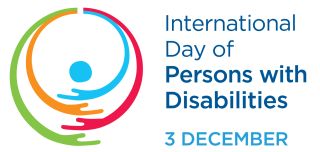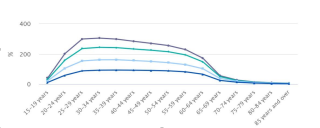2023 International Day Of Persons With Disabilities

This year's theme of the United Nations International Day of Persons with Disabilities (IDPD) on December 3rd 2023, will be "United in action to rescue and achieve the SDGs for, with and by persons with disabilities". The principle of Leaving No One Behind and what it means for Ireland is a focal point of Ireland’s 2023 Sustainable Development Goals (SDGs) objectives.
SDG1 calls for an end to poverty in all its manifestations. It aims to ensure peoples’ basic needs are met, by focusing on equal rights and access to economic and natural resources, including technology, property and basic and financial services.
Those not employed due to long-term illness or disability are one of the groups at highest risk of poverty with over one-third (35 per cent) classified as living on an income below the poverty line. Much like the experience of Ireland’s older people, the situation of this group has varied significantly over the last two decades. The group’s risk of poverty climbed from approximately three out of every ten persons in 1994 (29.5 per cent) to over six out of every ten in 2001 (66.5 per cent) before decreasing to approximately two out of every ten in the period 2008-2014. The most recent figures, for 2015-2022, mark another notable increase. As with other welfare dependent groups, these fluctuations parallel a period where policy first let the value of welfare support payments fall behind wage growth, before ultimately increasing them to catch-up. It is a cruel and unnecessary cycle. Social Justice Ireland believes there is an on-going need for targeted policies to assist this group. These include job creation, retraining and further increases in social welfare supports. There is also a very strong case to be made for introducing a non-means tested cost of disability allowance and we welcome recent moves to give greater policy consideration to this issue. However, implementing this necessary policy reform is overdue. It seems only logical that if people with a disability are to be equal participants in society, the extra costs generated by their disability should not be borne by them alone. Society at large should act to level the playing field by covering those extra but ordinary costs.
Employment and Disability
Census 2022 recorded 1,109,557 people "reported experiencing at least one long-lasting condition or difficulty to any extent" – that’s 22 per cent of the population. The report found that both these disabilities were strongly age-related.
Disabled persons generally cease their full-time education at an earlier age than the total population. According to the European Commission 2022 Country Report on Ireland, Ireland had higher than average early school leaving rates for people with disabilities (27.8 % vs the EU average of 23.6 %). Ireland has one of the widest early school leaving gaps between people with and without disabilities in the EU (22.5 percentage points vs the EU average of 12.6 percentage points).
The tertiary education attainment gap between people with and without disabilities is much wider than the EU average (24.6 percentage points vs the EU average of 13.2 percentage points), which aggravates inequalities in terms of access to employment and participation in society by this group.
There were 176,445 persons with a disability in the labour force giving a labour force participation rate of 30.2 per cent, compared with a rate of 61.4 per cent for the overall population. However, given the disproportionally large number of people aged 65 and over among the disabled population (34.9% compared with 13.4% of the general population), it is informative to examine the data for those aged 15 to 64 only. Among the total population in this age group participation rates were 78 per cent for men and 65.9 for women, while for those with disabilities the rates were 51.1 per cent and 42.2 per cent respectively.
Chart 1 shows the labour force participation rates by age. Top two lines are the male and female participation rates of the general population and the bottom two lines are the male and female participation rates of persons with a disability. The peak ages for labour force participation for those with disabilities were 30-34 years for men at 68.6 per cent, and 25-29 for women at 63.4 per cent. In the general population, the male participation rate peaks between 30-34 years at 93.1 per cent, while female participation peaks at 82.7 per cent between the ages of 30 and 34.
Chart 1: Labour Force participation rate for persons aged 15 and over by gender, 2016

The European Commission Country Report for Ireland 2022 revealed that Ireland has the largest disability employment gap in the EU, at 38.6%. It also noted that less than one third of people with disabilities were employed in 2019.
People with disabilities are still facing considerable challenges, although support is being enhanced. Ireland has one of the lowest employment rates for people with disabilities in the EU (26.2 % compared to 48.1 % in the EU in 2017) and one of the highest gaps between people with and without disabilities (45.1 percentage points). The Comprehensive Employment Strategy for People with Disabilities 2015-2024 aims at increasing the statutory target of 3 % of employees with disabilities in the public sector towards 6 % by 2024. In addition, a EUR 16 million Ability Programme (2018-2021) to invest in the employability of people with disabilities aged 1529 has been announced. Additional funding totalling EUR 150 million has been allocated for disability services in the 2019 budget. How this money will be invested remains to be seen as details have so far not been released on specific measures and programs.
In relation to disability support, the national consultation for ‘early engagement’ and the reconfiguration of the qualifying age for Domiciliary Care Allowance and Disability Allowance payments was conducted with the next steps still to be announced by the Government.
The UN Convention on the Rights of Persons with a Disability was adopted in 2006. Ireland ratified it in 2018, the first Human Rights treaty of the 21st Century and at its core is a commitment to ensure the rights of disabled people to be treated as full and equal citizens.
Article 27 of the UNCRPD "…recognises the right of persons with disabilities to work, on an equal basis with others; this includes the right to the opportunity to gain a living by work freely chosen or accepted in a labour market and work environment that is open, inclusive and accessible to persons with disabilities. States Parties shall safeguard and promote the realisation of the right to work, including for those who acquire a disability during the course of employment, by taking appropriate steps, including through legislation. We can realise that vision by taking a rights-based approach."
We must ensure:
- Eligibility and supports for all employment activation schemes include people with disabilities
- Increased funding for Personal Assistant hours and develop a person-centred approach to allocating those hours
- Fast-track reinstatement of Disability Allowance for those who have accessed employment, but then have to leave
- Resource current strategies.
Social Justice Ireland urges Government to:
- Introduce a cost of disability payment to account for the increased costs associated with living with a disability
- Continued investment in skills, education and training to harness the abilities of people with disabilities.
- Introduce a system of Basic Income to provide a universal “floor” to allow greater flexibility for people living with a disability to access work that suits their abilities and needs.